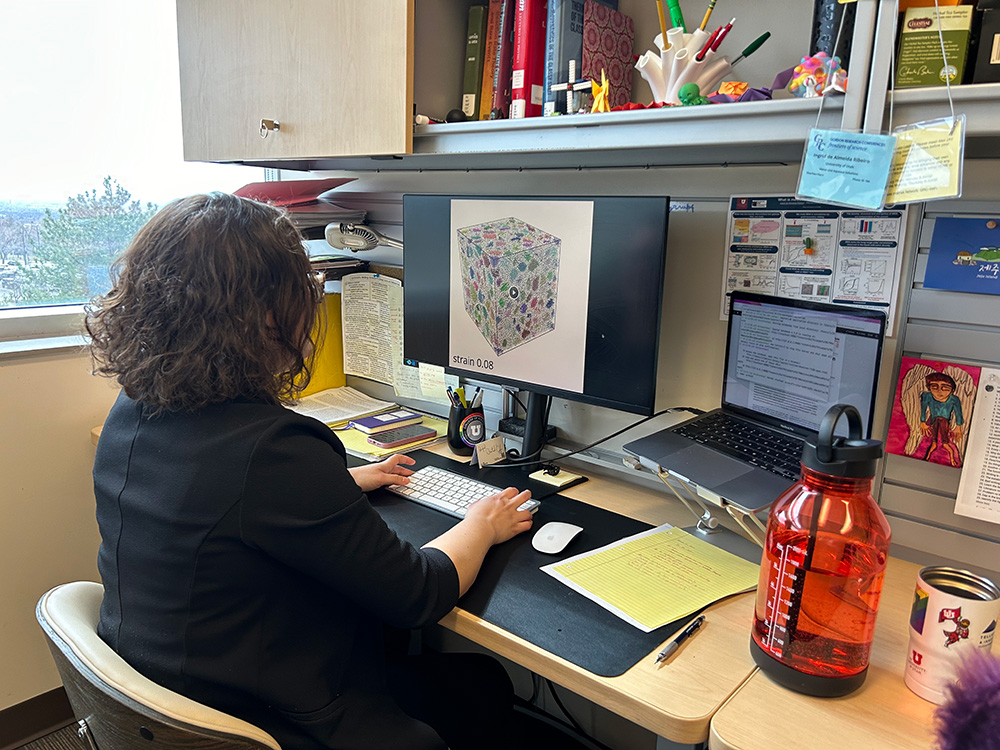Ingrid De Almeida Ribeiro - PostDoctoral Fellow in Molinero Group
 I am from Rio de Janeiro, Brazil. I have a Bachelor’s degree in Physics from Universidade
Federal Fluminense. I began my research journey with condensed matter physics focusing
on the electronic structure of semiconductor alloys. During my undergraduate career,
I spent two semesters as a visiting student at the University of Manitoba in Canada,
where I worked in an experimental lab on spintronics in magnetic materials. After
that, I did both my Master's and PhD in Physics at Universidade Estadual de Campinas
in São Paulo. My thesis is about the structure and dynamics of water and the mechanical
properties of ice using molecular simulations.
I am from Rio de Janeiro, Brazil. I have a Bachelor’s degree in Physics from Universidade
Federal Fluminense. I began my research journey with condensed matter physics focusing
on the electronic structure of semiconductor alloys. During my undergraduate career,
I spent two semesters as a visiting student at the University of Manitoba in Canada,
where I worked in an experimental lab on spintronics in magnetic materials. After
that, I did both my Master's and PhD in Physics at Universidade Estadual de Campinas
in São Paulo. My thesis is about the structure and dynamics of water and the mechanical
properties of ice using molecular simulations.
Now as a Postdoc in Valeria Molinero’s group, I work on molecular simulations of supercooled water, ice, as well as the amorphous phases of water. My research involves a wide range of aspects including structure, thermodynamics, and mechanical properties. I am also actively engaged in interdisciplinary collaborations, combining theoretical frameworks with experimental data to investigate how ice forms on biological surfaces such as bacteria and fungi.
What motivates and inspires you?
Curiosity is my driving force. Ever since I was young, I have been intrigued by how things work. I am also inspired by the tales of scientists who persevered through challenges.
What interests you most about your research?
Since graduate school, I became fascinated with the complex phase diagram of water. Besides the familiar ice found in the freezer, there are other eighteen phases that are typically created in the lab under extreme conditions of temperature and pressure. Water presents many fascinating examples beyond this. Exploring and trying to figure out the unusual behavior of water using thermodynamics, statistical mechanics, and data science has been incredibly rewarding.
What do you wish you had known when you first came to Utah?
I wish I knew how dry it is here! I definitely advise getting the best skin moisturizer.
Your favorite University of Utah experience…
I have had so many good experiences here, but if I have to pick one, my favorite experience is attending the live performances at the School of Music.
What research topics being explored in the world interest you the most?
I am interested in research topics related to climate change and sustainable energy sources. This includes renewable energy technologies, carbon capture and storage methods, and climate modeling. These areas of research are crucial for a more sustainable future.
 What do you do for fun outside the lab? How do you handle stress?
What do you do for fun outside the lab? How do you handle stress?
I have fun cooking Brazilian vegan dishes for family and friends, reading books, listening to audiobooks, and doing paint-by-numbers. I also enjoy spending time outdoors. Whether it’s hiking in the mountains and parks or biking around, being in nature is my go-to stress reliever. These activities help me handle stress and are good for my mental health.
What advice do you have for prospective postdocs?
Meet researchers in the same as well as in different fields. Join the workshops for professional development. Try to develop as much networking as possible, you can get very good advice from that.
What is the most significant difference between life as a grad student and a postdoc researcher?
The biggest difference between being a graduate student and a postdoc is the level of independence and responsibilities. As a postdoc, you are expected to work more independently from your supervisor, lead projects, come up with new research ideas, and mentor graduate students.
What do you plan to do after your postdoc?
I want to do research on materials science, focusing on the physics of liquids, solids, and amorphous materials. I am particularly interested in exploring other liquids that exhibit water-like thermodynamic anomalies. Understanding these anomalies is crucial for studying glass transitions, phase transitions, and how materials behave under extreme conditions. I also like the idea of mentoring students and inspiring them to engage in research.
